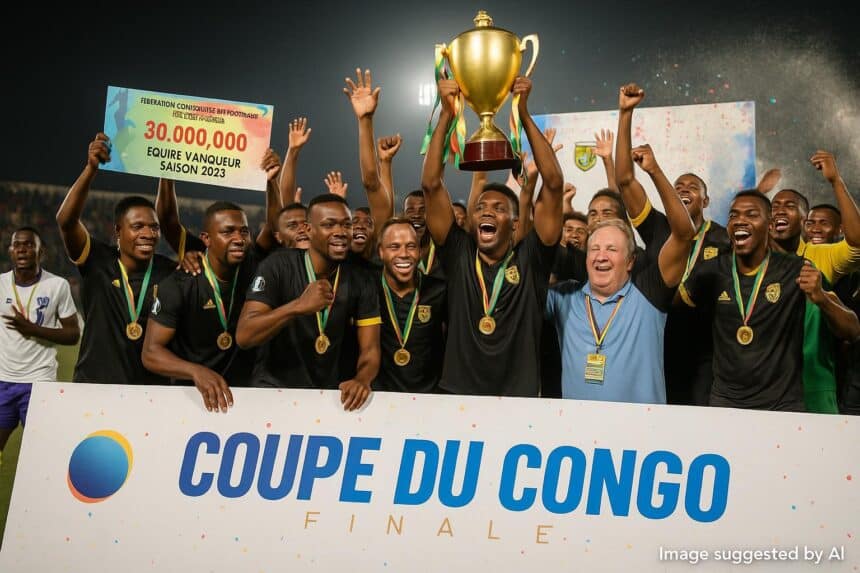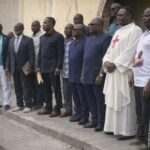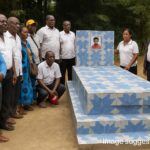A Tradition Rooted in Nation-Building
Since 1985 the Coupe du Congo has operated as more than a football match; it was envisaged by presidential decree as a civic ritual binding diverse regions in a shared celebration of Independence Day. The festive atmosphere in stadiums traditionally mirrored the country’s aspiration for cohesion (Les Dépêches de Brazzaville).
Supporters remember 15 August evenings when stadium lights framed meticulous choreography, military bands and a handover of the gleaming silver trophy by the head of state or his envoy. The scene reinforced the constitutional message that sport, culture and sovereignty are interwoven facets of the national narrative.
Infrastructure, Policy and Presidential Patronage
Under the accelerated municipalisation programme, modern arenas sprouted in Owando, Dolisie and Ouesso, creating a geographic rotation for finals and encouraging local talent to bloom. Technical advisers routinely linked better grass surfaces and rehabilitation centres with measurable gains in player fitness (Ministry of Sports report, 2023).
The presidency’s symbolic stewardship extended beyond protocol. State funding underwrote team travel, prize money and broadcasting rights, ensuring that even remote districts felt represented. The resulting visibility for sponsors maintained a virtuous cycle long regarded by regional observers as a model for sporting diplomacy in Central Africa (ECCAS brief, 2024).
Why Consecutive Cancellations Matter
The abrupt halt of the 2024 Cup at the quarter-final stage, prompted by diverging readings of federation statutes, interrupted an unbroken sequence that had survived civil conflict and economic downturns. FIFA’s temporary suspension of Fécofoot highlighted the regulatory stakes around governance and compliance (FIFA communiqué, 2024).
When the 2025 edition was cancelled on 3 July, the federation framed the measure as a pragmatic pause demanded by ‘collective considerations’. While officials avoided public recrimination, coaches privately feared a loss of momentum for emerging prospects who rely on the tournament for scouting and match practice (interviews, Brazzaville, August 2025).
International Ramifications for Clubs and the Red Devils
Congo’s two continental representatives now enter CAF preliminaries with minimal competitive mileage. AC Léopards draw the creative Black Bulls of Mozambique, while AS Otohô face Primeiro de Agosto, an Angolan side renowned for pressing intensity. Technical staff acknowledge the psychological hurdle of meeting battle-hardened opponents after a domestic hiatus.
National-team selectors, preparing for the East African-hosted African Nations Championship, point to the Cup’s absence as a blind spot. ‘Form must be observed in real time, not guessed,’ head coach Isaac Ngata remarked, stressing that training camp data cannot fully replicate stadium pressure (Radio Congo interview, 12 August 2025).
Statistical analysts estimate players now average 320 competitive minutes fewer than their regional peers this calendar year. That deficit, they warn, could translate into slower decision-making during critical phases, a pattern already evident in friendly defeats to Gabon and Benin in June (CAF statistics portal).
Expert Voices on the Road Ahead
Sports economist Dr. Mireille Oba argues that postponement costs are dwarfed by the reputational premium of delivering an impeccably governed comeback edition. ‘A one-year revenue dip can be recouped; credibility cannot,’ she told this publication in a telephone interview from Paris on 18 August.
International development partners echo the sentiment. A senior EU delegation source notes that stadium maintenance grants earmarked for 2025 may roll over if a robust compliance framework is tabled. ‘Transparency remains the hinge. The political commitment appears evident; now it requires technical articulation,’ the diplomat said.
Balancing Calendars and Diplomatic Visibility
CAF’s registration window, closing well before mid-August, complicates the Cup’s historical slot on Independence Eve. Federation planners are studying models where domestic cups finish by June, aligning with continental deadlines without diluting national symbolism. Morocco’s Throne Cup is cited as an operational template.
Shifting the calendar could also expand global broadcast opportunities. Media rights specialists at Infront estimate that a May final avoids clashes with Europe’s club season climax, widening satellite carriage in francophone markets. Such exposure, they add, bolsters soft-power dividends for Brazzaville’s broader diplomatic outreach.
Charting a Sustainable Future for the Cup
The Ministry of Sports is drafting revised statutes to clarify election procedures and dispute resolution, a move expected to land before Parliament’s October session. Observers view legislative endorsement as decisive for unlocking both domestic sponsorship and international trust.
Parallel to governance upgrades, a task force comprising club presidents and former internationals has proposed a phased reintroduction: regional qualifiers this December, national semifinals in March, and a grand final aligned with the Republic Day military parade. Early feedback suggests broadcasters and municipalities favour the staggered model.
Through these negotiations, officials emphasize the founding ethos: the Coupe du Congo must remain a unifying ritual, not merely a fixture list. With calibrated governance, calendar reform and sustained presidential backing, stakeholders believe the trophy can again showcase Congolese talent while projecting a message of stability cherished by diplomatic partners.






















